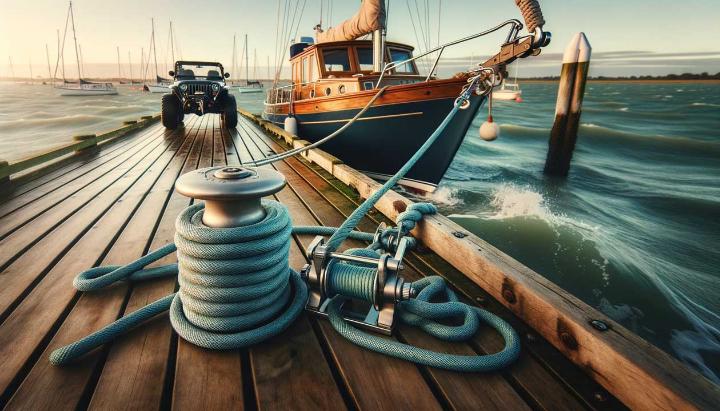Have you ever found yourself in a sticky situation, desperately wishing you had a stronger rope? Whether you're an off-road enthusiast battling treacherous terrain or a boat owner navigating choppy waters, the strength and resilience of your rope can make all the difference. Enter nylon rope – the unsung hero of the rope world.
In the realm of rope materials, nylon stands head and shoulders above the rest, boasting unparalleled strength and elasticity. It's this unique combination that makes nylon rope the go-to choice for demanding applications, particularly in off-road vehicle recovery and marine docking. But what exactly sets nylon apart, and why should you care about its diameter?
In this post, we'll unravel the mysteries of nylon rope diameter strength, focusing on the powerhouse 2 inch and 5 inch varieties. We'll explore how these ropes can transform your off-road adventures and docking experiences, providing the reliability and peace of mind you need when the stakes are high. Whether you're a weekend warrior or a seasoned professional, understanding the nuances of nylon rope diameter could be the key to your next successful expedition or smooth sailing experience.
So, buckle up and prepare to dive into the world of high-performance ropes. By the end of this journey, you'll not only appreciate the superior qualities of nylon rope but also know exactly how to choose the right diameter for your specific needs. Let's get started!
Nylon Rope: The Superior Choice for Strength and Elasticity
When it comes to choosing the right rope for demanding applications, nylon rope stands head and shoulders above the rest. As an avid outdoorsman and marine enthusiast, I've had my fair share of experiences with various rope materials, but nylon has consistently impressed me with its remarkable properties.
Unmatched Shock Absorption Capabilities
One of the most striking features of nylon rope is its exceptional ability to absorb shock. Picture this: you're out on a rugged off-road adventure, and your vehicle gets stuck in a muddy patch. As you attach a recovery rope to pull it out, you want a material that can handle the sudden jerks and loads without snapping. That's where nylon truly shines.
- Impressive stretch capacity: Nylon rope can stretch up to 15-28% before breaking, providing a crucial buffer against sudden forces.
- Energy absorption: This elasticity allows nylon to absorb and dissipate energy, reducing the risk of damage to vehicles or equipment during recovery operations.
- Gradual load application: The rope's stretch ensures that force is applied gradually, making the recovery process smoother and safer.

Versatility in Dynamic Load Applications
Nylon rope's unique combination of strength and elasticity makes it incredibly versatile. Whether you're securing cargo on a bumpy road or mooring a boat in choppy waters, nylon rope adapts to the situation with ease.
I remember a particularly stormy day at the marina when I witnessed the difference between nylon and other rope materials firsthand. While some boats with less elastic ropes were straining against their moorings, those secured with nylon lines seemed to dance with the waves, absorbing the energy without putting excessive stress on the cleats or the boat itself.
Did you know? Nylon rope is not only strong and elastic but also resistant to oil, gasoline, and many chemicals, making it ideal for marine and industrial use.
So, whether you're planning your next off-road adventure or outfitting your boat for the season, consider the unparalleled benefits of nylon rope. Its superior strength, exceptional elasticity, and versatility make it the go-to choice for those who demand the best from their equipment. After all, when the going gets tough, you want a rope that's up to the challenge – and nylon delivers every time.
Nylon Rope Diameter: Understanding Strength Implications
When it comes to nylon rope, size really does matter. As an avid sailor and occasional off-road enthusiast, I've learned that understanding the relationship between rope diameter and strength is crucial for safety and performance. Let's dive into the fascinating world of nylon rope diameters and unravel the mysteries of their strength implications.
Factors Affecting Rope Strength
The strength of a nylon rope isn't just about its thickness. Several factors come into play:
- Diameter: Generally, a larger diameter means increased strength. However, it's not a linear relationship.
- Material quality: The grade of nylon used significantly impacts the rope's overall strength.
- Construction technique: How the rope is braided or twisted affects its load-bearing capacity.
- Environmental conditions: Exposure to UV rays, chemicals, or extreme temperatures can degrade rope strength over time.
I remember a camping trip where a friend brought a thin nylon rope for our bear bag. While it seemed sturdy enough, I insisted on using a thicker diameter. That night, as we hoisted our food high into a tree, I was grateful for the extra peace of mind that came with the stronger rope.
Calculating Breaking Strength for Different Diameters
Understanding breaking strength is crucial when selecting the right nylon rope for your needs. Here's a simple guide:
Breaking Strength Formula
Breaking Strength (lbs) ≈ (Diameter in inches)2 x 12,000
Let's look at some common nylon rope diameters and their approximate breaking strengths:
- 1/4 inch (6mm): ~750 lbs (340 kg)
- 3/8 inch (9mm): ~1,700 lbs (770 kg)
- 1/2 inch (12mm): ~3,000 lbs (1,360 kg)
- 5/8 inch (16mm): ~4,700 lbs (2,130 kg)
- 2 inch (50mm): ~48,000 lbs (21,770 kg)
- 5 inch (127mm): ~300,000 lbs (136,078 kg)
It's important to note that these are approximate values. Always check the manufacturer's specifications for accurate ratings.
Remember, the safe working load is typically only 10-15% of the breaking strength. Always err on the side of caution when selecting a rope for your application.
When choosing between a 2 inch diameter rope and a 5 inch diameter rope, consider your specific needs. The 2 inch rope is more manageable for most applications, while the 5 inch behemoth is reserved for heavy industrial use or large ships.
Have you ever had to choose between different nylon rope diameters for a project? What factors influenced your decision? Share your experiences in the comments below – I'd love to hear your rope tales!
Off-Road Applications: Leveraging Nylon Rope's Strength
When it comes to off-road adventures, having the right equipment can make all the difference between an exhilarating experience and a frustrating ordeal. As an avid off-roader, I've come to appreciate the unparalleled strength and versatility of nylon rope in tackling the toughest terrains. Let's explore how this remarkable material has become a game-changer in off-road applications.
Kinetic Recovery in Off-Road Scenarios
Picture this: you're deep in the backcountry, your 4x4 bogged down in thick mud. This is where kinetic recovery ropes, made from high-strength nylon, truly shine. Unlike static ropes, kinetic recovery ropes harness the power of elasticity to safely extract stuck vehicles.
- Energy absorption: Nylon's ability to stretch up to 28% allows it to absorb and release energy gradually, reducing shock loads on vehicle recovery points.
- Reduced risk of damage: The rope's elasticity minimises the chance of snapping, which can be dangerous and damaging to vehicles.
- Improved recovery efficiency: The 'snap' effect of the stretched rope provides additional pulling power, making extractions smoother and more effective.

I remember a particularly challenging recovery operation in the Victorian High Country. We were using a traditional chain when it suddenly snapped, narrowly missing my mate's ute. That was the day I switched to nylon kinetic ropes and never looked back.
Advantages of Nylon for Off-Road Use
Nylon rope's unique properties make it the top choice for off-road enthusiasts. Here's why it outperforms other materials:
- Superior strength-to-weight ratio: Nylon offers incredible strength without the bulk, making it easy to carry and handle in the field.
- UV resistance: Unlike polypropylene ropes that degrade quickly in sunlight, nylon maintains its strength even after prolonged exposure to harsh Australian sun.
- Abrasion resistance: Nylon's durability allows it to withstand the rough treatment often encountered in off-road scenarios, from dragging over rocky terrain to rubbing against tree bark.
- Water resistance: While nylon can absorb some water, it retains most of its strength when wet, unlike natural fibres like cotton or hemp.
Pro Tip: Always inspect your nylon rope before each use and replace it if you notice any signs of wear or damage. Safety should always be your top priority in off-road recovery situations.
When selecting a nylon rope for off-road use, consider the size of your vehicle and the expected recovery loads. For most 4x4s, a 2-inch diameter rope is sufficient, offering a good balance between strength and manageability. However, for larger vehicles or extreme conditions, you might want to consider a thicker rope, up to 5 inches in diameter for heavy-duty applications. Explore our nylon ropes designed specifically for heavy-duty off-road applications for more options.
Have you had any memorable experiences using nylon ropes in off-road situations? Share your stories in the comments below – I'd love to hear how this versatile material has helped you conquer the great outdoors!
Nylon Rope's Superiority in Docking and Mooring
As a seasoned sailor, I've learned that choosing the right mooring rope can make or break your docking experience. When it comes to securing your vessel, nylon rope stands head and shoulders above the rest. Let's dive into why nylon has become the go-to choice for savvy boaters worldwide.
The Strength and Elasticity of Nylon Mooring Lines
Nylon's unique combination of strength and elasticity is what sets it apart in the world of marine ropes. I remember the first time I used a nylon mooring line during a particularly choppy day at the marina. The way it stretched and absorbed the shock of the waves was nothing short of impressive.
- Superior elongation: Nylon boasts 5-10% more elongation than polyester, allowing it to absorb sudden shocks and reduce strain on cleats and bollards.
- Impressive strength-to-weight ratio: Despite its elasticity, nylon maintains a high breaking strength, outperforming many heavier alternatives.
- Energy absorption: The rope's ability to stretch and retract helps dissipate energy from waves and wind, protecting both your boat and the dock.

This elasticity isn't just about comfort; it's a crucial safety feature. During a storm last summer, I watched as boats with less elastic ropes strained against their moorings, while those with nylon lines seemed to dance with the waves, remaining securely in place.
Reliability and Resilience: Why Nylon Outperforms Other Materials
When it comes to long-term performance in harsh marine environments, nylon truly shines. Its durability and resistance to the elements make it a cost-effective choice for boaters who demand reliability.
- UV resistance: Nylon's inherent UV resistance helps it maintain strength even after prolonged exposure to harsh sunlight.
- Water performance: Unlike some materials that weaken when wet, nylon retains much of its strength in water, making it ideal for marine use.
- Abrasion resistance: Nylon's tough fibres stand up well to the constant rubbing and chafing common in docking situations.
A study by the Marine Safety Institute found that nylon mooring lines lasted on average 20% longer than their polyester counterparts in real-world conditions. This longevity not only saves money but also provides peace of mind during critical mooring situations.
Pro Tip: When selecting nylon dock lines, opt for double-braided construction for increased strength and durability. This type of rope offers the best balance of stretch and strength for most mooring applications. For more on choosing the best marine ropes, check out our guide to marine braided ropes.
Have you ever experienced the difference between nylon and other mooring ropes firsthand? I'd love to hear your stories in the comments below. Whether you're a weekend warrior or a seasoned captain, understanding the benefits of nylon mooring ropes can elevate your boating experience and keep your vessel safe in any conditions.
Nylon ropes are the ideal choice for off-road and docking applications due to their exceptional strength and elasticity. With unmatched shock absorption, nylon ropes can handle sudden forces, making them perfect for vehicle recovery and mooring tasks. When selecting the right rope, considering the nylon rope diameter is crucial for optimal performance. For instance, a 5 inch diameter rope offers immense strength suitable for heavy-duty tasks, while a 2 inch diameter rope is more manageable for standard uses. Whether using nylon rope for securing a vehicle in rough terrains or mooring a vessel, its superior durability and stretch capacity ensure reliability.
Discover Your Custom Rope Solution Today
If you need high-quality, customized nylon rope for off-road or docking applications, fill out the form above. Our experts will help you choose the perfect rope tailored to your specific needs. Don't miss the opportunity to enhance your equipment with the best nylon ropes available.